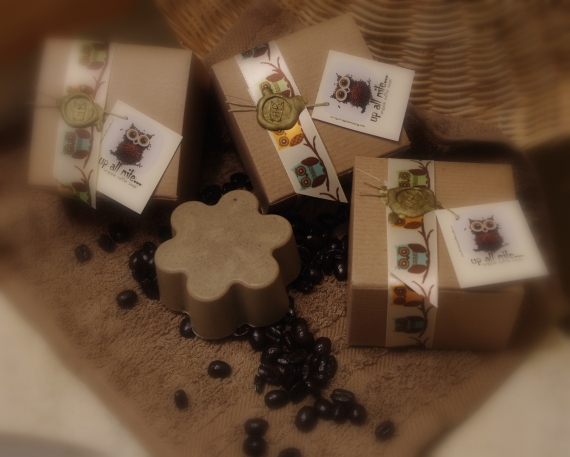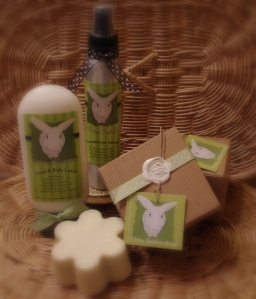Up All Nite! Organic Coffee Soap
The Watership Mercantile & Soap Company
this one is very unique and the research into coffee was fascinating, so…
Being a coffee shop junkie, I spend a lot of time immersed in the coffee culture. Friends and shop owners kept asking, Lori, do you make a coffee soap? So, off to Google I go for some research. Here is what I discovered:
The scent of coffee can invigorate you and reset your sense of smell. This was no surprise, we keep a jar of coffee beans at the trade shows to assist customers when sampling our soap scents. Coffee can also eliminate strong odors which makes it a natural for the kitchen sink! “But really, coffee in soap?” you may ask. The aroma of good coffee is an exquisite pleasure and like good wine, the aroma is as sensual as the taste. Earthy & spicy with a hint of vanilla, honey, butter and even dark chocolate.
I was ‘hooked’.
I found lots of coffee soap recipes and products online, but many were made from or called for synthetic fragrances or instant coffee, and so many soap makers use alcohol or petroleum products because they are cheaper. I wanted a natural scent, not over powering, subtle and delicate, organic ingredients if possible, so I looked into Coffee Oil.
Coffee Essential Oil, Coffea arabica, has a multitude of possible uses as a tonic, stimulant, and diuretic. It can be burned as a room deodorizer and is considered to be an excellent anti-oxidant. It has also been used to combat chronic melancholia, respiratory issues, stings, fevers, general nausea. A recent Harvard Medical School study( http://www.communityfood.com/articles/articles/56/1/Coffee-and-Depression-Coffee-as-an-Antidepressant/Page1.html ) has shown that women who drink coffee have a 70% less risk of committing suicide. They didn’t say anything about men, but spiders who are sprayed with caffeine weave distorted webs! Also note that Spiders never sleep, with or without coffee.
Time to shop…well coffee essential oil is a bit expensive…an understatement!… but I wanted an authentic product. I decided to use an organic oil from Brazil that was cold press extracted.
For a brief moment I considered trying the extraction process myself. I found this (link below) and may even give it a whirl in the future!
How to Extract Coffee Oil From a Coffee Bean | eHow.com http://www.ehow.com/how_5824318_extract-coffee-oil-coffee-bean.html#ixzz1LQOz70VQ
I used oatmeal and extra fine espresso grounds for exfoliation. The only downside to the grounds is they are insolvent, a small inconvenience. I would love some customer feed back on this for future production!
Coffee…Coffee…Coffee…
The history surrounding coffee is vast, over a thousand years. As early as the 9th century Ethiopian shepherds had discovered the energizing effects that coffee seemed to have on their flocks. An Islamic monk was vexed by his inability to stay awake during his prayers saw a shepherd dancing with his herd and was told a specific bean caused the happiness. Convinced that Mohammed had sent him this herb as a gift to keep him awake, the monastery was thereafter called the home of the Wakeful Monks, as they would drink coffee as they prayed. (A similar legend exists in China regarding tea.) African warriors would mix mashed coffee berries with animal fat, roll them into balls, and eat them before battle.
In the late 1500s, coffee had reached Europe and Vatican officials were clamoring to condemn it as Satanic. After all, it came from the Islamic world, so the Catholic church was understandably loath to embrace anything that came from the “land of the infidels.” According to legend, Vatican officials asked Pope Clement VIII to impose a ban on coffee, but he refused to do so before trying it first himself. Thus, he ordered that some coffee be prepared for him. He evidently enjoyed it very much because legends says that he remarked “This Satan’s drink is delicious…it would be a pity to let the infidels have exclusive use of it. We shall fool Satan by baptizing it.”
Clement VIII’s fondness for coffee, made him unwilling to ban it, so he instead gave it his blessing by “baptizing” it in 1600. That action removed the biggest potential obstacle for the popularization of coffee in Europe. Less than 50 years later, coffee houses began popping up in Italy and by 1675, there were some 3,000 coffee houses in England. By that time, coffee drinking was also quite popular in France where coffee houses soon became the meeting places for like-minded individuals to discuss new (often revolutionary) ideas. Indeed, the French Revolution was perhaps as much the product of the simple coffee bean than it was anything else.
In the western world and urban centers globally, espresso is the social lubricant of our times. A social atmosphere that depends heavily on coffee and refers to those who participate as “cafe au laiters” and “espressonites”. Coffee houses date back centuries and are traditionally social hubs as well as artistic and intellectual centers, they were—and continue to be—venues where people gather to talk, write, read, entertain one another, or pass the time.
In many urban centers around the world, it is not unusual to see several espresso shops and stands within walking distance of each other or on opposite corners of the same intersection, typically with customers overflowing into parking lots. Thus, the term coffee culture is also used frequently in popular and business media to describe the deep impact of the market penetration of coffee-serving establishments.
So will coffee soap make you intellectual, artistic, cure your headaches or depression…? I think not. You will enjoy a unique and novel bath/shower experience.
o
For more information about Up all Nite! and other fine products made with time-honored quality..visit


